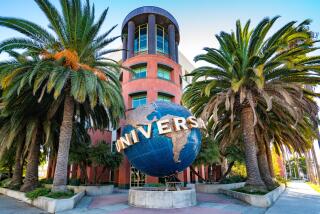Vivendi Shrugs Off Woes of Rivals to Maintain Profit Growth Outlook
- Share via
Vivendi Universal, the world’s fourth-largest media company, said Tuesday that it sticking by its sales and earnings forecasts for 2001 and 2002, despite the economic storm that has clobbered rivals.
Chief Executive Jean-Marie Messier said Vivendi will meet its targets this year despite fallout from the terrorist attacks because the French-American conglomerate is less dependent on advertising.
Messier said Vivendi is on track to meet its goal of boosting revenue and operating earnings by 10% and 35%, respectively, this year.
In these forecasts, operating results are earnings before interest, taxes, depreciation and amortization expenses--known as EBITDA. It is a widely used measure of the performance of a company’s basic business.
Messier also was optimistic about Vivendi’s fortunes in 2002.
“Despite the events of Sept. 11, . . . looking at the internal dynamics and recession resiliency of many of our businesses, we currently feel very comfortable with market expectations in 2002,” Messier said in a conference call with analysts.
Analysts have estimated that Vivendi will post EBITDA results of about $4.59 billion in 2001 and $5.5 billion in 2002.
Messier’s upbeat outlook comes as several other entertainment and media companies, including Viacom Inc., Walt Disney Co. and AOL Time Warner Inc., warn of reduced earnings.
Vivendi on Tuesday reported more details on its performance in the first half of the year, supplementing data reported in July.
The company said its first-half EBITDA results were $3.64 billion, up 42% from a year earlier, as sales rose 11% to $24.4 billion.
The gains were driven by a string of movie hits at Universal Studios, including “Jurassic Park III” and “American Pie 2,” and growth in Vivendi’s telecom business.
Vivendi will grow even in an economic downturn, Messier said, citing sales of online games, DVD and videos and revenue from Pressplay, the online music-subscription service Vivendi and Sony Corp. are launching. Universal, the world’s leading music company, also will begin selling anti-piracy CD software next month.
Further declines in consumer confidence could curtail spending on movies, music and theme park visits in the U.S., where Vivendi makes about 40% of its revenue.
Attendance at Universal’s theme parks in Orlando and Hollywood dropped by as much as 50% after the Sept. 11 terrorist attacks, executives said. Universal Orlando has joined Walt Disney World in cutting back workers’ hours.
But unlike Disney, whose parks and resorts comprise about a third of the company, theme parks are a small percentage of Vivendi’s overall business.
And, analysts say, Vivendi is less vulnerable to recession compared with its peers because less than 5% of its business is advertising-related. Vivendi’s revenue mostly comes from subscription services, such as Europe’s leading pay TV firm, Canal-Plus; educational publishing; and environmental services.
But Messier’s quest to turn a 147-year-old water and energy utility into a global media and entertainment conglomerate still faces skepticism among some investors. Vivendi’s stock, which dropped 65 cents to $44.35 on Tuesday on the New York Stock Exchange, has lost more than a third of its value in the last three months.
Also Tuesday, Vivendi said it was transferring its 26% stake in British Sky Broadcasting Group to Deutsche Bank in a first step toward complying with a European Commission ruling that the holding be divested. Under terms of the deal with Deutsche Bank, Vivendi will get about $4.2 billion for its British Sky stake over five years.
Vivendi will use the money to pay down debt and buy back 33 million shares, or 3% of the total.
*
Times staff writer Jon Healey contributed to this report.
More to Read
The biggest entertainment stories
Get our big stories about Hollywood, film, television, music, arts, culture and more right in your inbox as soon as they publish.
You may occasionally receive promotional content from the Los Angeles Times.









